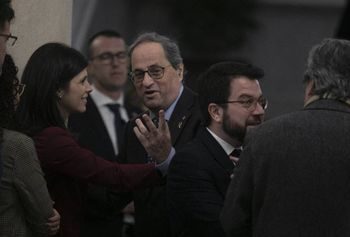
Reed Hastings and Francisco Ramos, citizens of the US and Mexico respectively, are the perfect embodiment of Spanglish – the language and cultural hybrid that has been coming together for some years in a laudable bid for world domination. While they themselves have only been a team for a year and a half, Hastings and Ramos have a similar goal in mind.
Their secret weapon is Netflix, the online entertainment streaming giant, which has just opened Casa Netflix, the company’s first production center in Europe. Here, at this Spain-based center, they aim to produce between four and six series a year – a figure that will rise to between 10 and 12 productions that will be filmed across the length and breadth of the country.
Move over, Hollywood. A new wave of global television shows made in Spanish has arrived. But why stop there? There will be original-version productions in a number of other languages, plus dubbing and subtitling into 10 and 28 languages, respectively.
We don’t just have the best screenwriters, directors, showrunners and craftsmen, we also have top-of-the-range installations
Francisco Ramos
Hastings, 58, is the co-founder and CEO of Netflix, a project that started out as a mail-based DVD rental service and has ended up as an on-demand online entertainment multinational available in 190 countries with 139 million subscribers, three million of whom are in Spain.
Ramos, 50, is a producer with several blockbusters under his belt such as Three Steps Above Heaven and Superlópez. When he and Hastings crossed paths during the making of the series Élite, they agreed that Ramos would take charge of the original content division for Latin America and Spain.
On the day of the inauguration ceremony for Casa Netflix in Tres Cantos, outside Madrid, this dynamic duo came to town and gamely posed for photos in the dining booths generally used by the company’s employees for lunch. After renting the facilities from the producer Secuoya, Europe’s Netflix hub consists of 22,000 square meters that accommodates three film sets and a further two in progress that will be ready at the end of the year.
“We don’t just have the best screenwriters, directors, showrunners and craftsmen, we also have top-of-the-range installations,” says Ramos. “Madrid is our office, but that doesn’t mean that we are going to produce everything here. In fact, we are already producing shows across Spain, in Andalusia, Catalonia, Cantabria, Asturias, Galicia and the Canary Islands. This country doesn’t just have artistic wealth, it is also diverse in terms of the landscape and culture.”

According to the company’s own calculations, approximately 13,000 people, including actors, behind-the-scenes technicians and extras, worked on original projects in Spain in 2018, a figure that will rise to 25,000 this year.
While the directors meet in one room, there are dozens of journalists one floor down enjoying the hors-d’oeuvre being passed around. Hastings is only able to give one interview and he gives it to EL PAÍS. He is on a tight schedule packed with meetings and events, including a royal reception. The little free time that he has over is being spent in some of the city’s best restaurants. That is all he has been able to see of Madrid, he says, while admitting that he only speaks very basic Spanish. “I am going to move here. That’s why it says Reed Hastings on the door,” he jokes. “No, I’m always travelling, but Paco will spend more time here, as well as in Mexico and LA.”
Several days earlier, Apple unveiled its own streaming platform, a project that Steven Spielberg is involved in – surprisingly perhaps, given that he once railed against streaming services and their effect on movie theaters. “The first thing I thought after the ad for Apple’s streaming service was that I want to see their programs, some of them seem great,” says Hastings. With his greying hair and goatee and astute gaze, the Netflix exec doesn’t dodge any of the questions fired at him, but nor does he get into too much detail. He declares that the growing competition will only make the corporation stronger. “We are a company that focuses on just one product that we feel passionately about,” he says. “Amazon, for example, is a massive company, but it does a lot of different things, including entertainment. So in that sense, our most direct rivals are Disney and HBO.”
Our most direct rivals are Disney and HBO
Reed Hastings
The opening of Casa Netflix in Spain sees the company taking the creation of its own content in different languages to the next level. Indeed, some months ago, the EU made it mandatory for streaming platforms to include at least 30% of European content.
Since it broke into the Spanish market in October 2015, Netflix has released 24 Spanish productions and 40 co-productions in conjunction with other companies. “People like to relax in their own language, so most people prefer dubbing to subtitles,” says Hastings.
From France to South Africa and India to Norway, the company is keeping a keen eye out for homegrown talent. “We have just taken on an exec to work with the African series and another one in the Middle East,” says Ramos.
With International successes like La Casa de Papel – Money Heist – Spain has emerged as a force to be reckoned with artistically, hence the decision to establish the headquarters here. “Netflix has allowed me to work in a way I’m comfortable with; with different, lateral material and characters with their own idiosyncratic characters,” says Álex Pina, the showrunner of Money Heist who is now producing another English-language series called White Lines, and has confirmed he is working on something “wildy Tarantinian.”

“It is in real time, and again we are doing away with the lines usually drawn between good and evil. It’s a lot like a road movie and we’ll have three women in the eye of the storm,” he enthuses. Pina took just nine minutes to convince Netflix execs to snap it up. “It was a very good pitch,” concedes Ramos, who makes it clear that you don’t have to be Álex Pina to get your ideas heard. “We get 10 to 15 pitches a week. Anyone can pitch an idea but we try to coordinate so that someone will hear it before it reaches us. The competition is fierce and we’ll say no if it is weak.”
Pina was invited along to the inauguration of Casa Netflix, together with the actor Álvaro Morte and director and president of the Spanish Film Academy, Mariano Barroso. While they officiated the event, an episode for the third season of Money Heist was being shot just meters away, behind the door to a studio where Hastings and Ramos have their photos taken before rushing off to their next appointment. “Things are only like this when the boss is here,” says Ramos.
During his down time, Hastings likes to drink coffee, explore the world and “sometimes watch TV.” Ramos used to go to Barcelona on weekends to visit his family and play golf, but now he spends his time keeping his eye on the competition. “It is important to know what everyone else is doing,” he says. “I watch a lot of Latin American soap operas these days.”
According to The Wall Street Journal, Netflix encourages its employees to point out who they would fire among their colleagues. This degree of internal transparency has proved a controversial ploy along with their habit of keeping certain statistics under wraps, such as viewing figures. It came to light last October that Netflix issued around $2 billion (€1.8 billion) in bonds to fund the production and acquisition of content. “We have a very small debt in relation to what we are worth,” says Hastings. “The company is worth €135 billion and our debt is less than €13.5 billion.”
But since it was founded in 1998, the company’s success has been eye-watering, with the name Netflix now all but synonymous with ‘television series’. “As far as I am concerned, it’s happened very slowly,” says Hastings, who admits that not everything he has touched has turned to gold. “The biggest [failure]? In 2011 we tried to create a DVD rental service [separate from streaming] called Qwikster. The customers didn’t like it at all.”
Having recovered from that particular flop, which led to the loss of 800,000 subscribers in the US, it looks increasingly as if the platform is poised to fight for the cultural domination of the entire planet. “Well, we are barred from China,” says Hastings. “But elsewhere, yes. We want to be the ones to discover the great storytellers and provide them with a global platform.”
English version by Heather Galloway.
Get real time update about this post categories directly on your device, subscribe now.





















